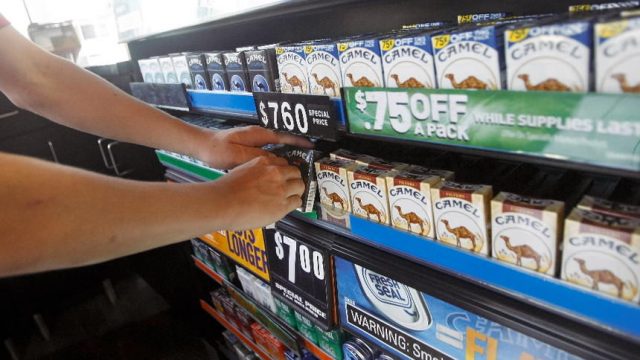Ballot Measure To Raise North Dakota's Tobacco Taxes By Nearly 400 Percent Reportedly In The Works

UPDATE: From the comments: “Strange that we may have a ballot measure to legalize marijuana and at the same time a ballot measure to attempt to tax the tobacco industry out of business in this state.”
North Dakota has some of the lowest tobacco tax rates in the nation. According to the Campaign for Tobacco Free Kids, as of January of 2016 North Dakota’s $0.44 per-pack tax on cigarettes was the fourth lowest in the nation (Missouri is the lowest at 17 cents per pack, followed by Virginia at 30 cents and Georgia at 37 cents).
During the 2015 legislative session two bills aimed at raising the per-pack tax (along with some other taxes on tobacco) failed by wide margins. In the House, HB1421, sponsored by Rep. Jon Nelson (R-Rugby), would raise the per-pack tax on cigarettes by about 250 percent, from $0.44 per pack to $1.54. On the Senate side, Senator Tim Mathern (D-Fargo) introduced SB2322 which would have raise the per-pack tax on cigarettes to $2.00 per pack, a 354 percent increase.
Nelson’s bill was defeated 34 – 56 in the House. Mathern’s bill failed 17-30 in the Senate.
[mks_pullquote align=”right” width=”300″ size=”24″ bg_color=”#ffffff” txt_color=”#000000″]”Prohibition by price has not worked in the past and we don’t think it’s going to work here either.”[/mks_pullquote]
Now it seems some folks want to take the issue to the voters. I’m told that a ballot measure to increase the per-pack tax on cigarettes by $1.75 per pack is in the works and will be announced this week.
That would be a nearly 400 percent increase in the tax.
I called the North Dakota chapter of the American Lung Association about the ballot measure and spoke with a gentleman named Jared Erling who told me, when I asked about the ballot measure, that “nobody is authorized to speak about that right now.”
So there’s obviously something in the works.
I spoke with Mike Rud at the North Dakota Petroleum Marketers Association about the potential for a tax increase. Rud’s organization opposed tobacco tax increases during the legislative session.
“If you’re talking about a 400 percent increase in taxes at a time when North Dakota is struggling, the last thing we need right now is for citizens of any sort to be hit with a new tax,” he said. “Now we’re going to tax people who can least afford to be taxed?”
Rud is referring to the fact that smokers tend to be on the lower end of the income scale.
[mks_pullquote align=”left” width=”300″ size=”24″ bg_color=”#ffffff” txt_color=”#000000″]I suspect this move might have less to do with stopping tobacco use than keeping the money flowing for the anti-tobacco people.[/mks_pullquote]
“These guys have done a pretty decent job to get people to quit somking,” Rud added, speaking about anti-tobacco activists. “But at some point personal responsibility has to step in. Prohibition by price has not worked in the past and we don’t think it’s going to work here either.”
There’s something to that argument from Rud. No doubt the anti-tobacco activists behind the measure will argue that their motivation is to stop smoking, but there doesn’t seem to be a strong tie between tax rates and smoking. For instance, North Dakota has the 4th lowest tobacco tax, but only the 15th highest rate of smoking according to the Centers for Disease Control.
Missouri, which has the lowest tax in the nation by far, comes in only at 14th. Virginia, with the second lowest tax, has the 21st highest rate of cigarette use and George, with the third lowest tax, ranks 30th.
I suspect this move might have less to do with stopping tobacco use than keeping the money flowing for the anti-tobacco people. In 2008 North Dakota voters approved Measure 3 which created a state agency called the Center for Tobacco Prevention and Control (you probably know them as BreatheND). Per their website, that group is funded by the Strategic Contribution Fund portion of the tobacco class action master settlement.
But those payments are ending in 2017. A massive hike in tobacco taxes might be just the ticket to keep all the anti-tobacco bureaucrats employed, no?




